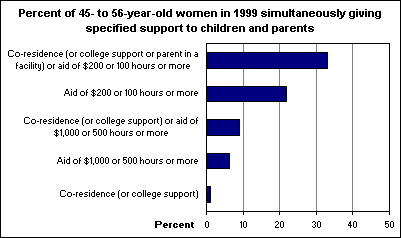The ’sandwich generation’
October 05, 2006
In the individual sense, the term "sandwich generation" describes people who are simultaneously handling the demands of caring for their aging parents and supporting their dependent children.

[Chart data—TXT]
A recent study estimates how many women 45 to 56 years old are part of the sandwich generation based on data from the National Longitudinal Survey of Young Women, which was started in 1968 and discontinued in 2003.
The chart shows the percentage of women who are members of the sandwich generation based on various criteria. Only a little more than 1 percent of women in this age group have both parents and children living with them (including children they are supporting at college).
It is common, however, for women to be supporting their children or parents in less dramatic ways. More then one-fifth of women gave either $200 (or more) or 100 hours (or more) to both their parents and children during the year. If this definition is expanded to include women whose parents are co-resident or in a supported nursing facility, and those whose children are co-resident or who are being supported at college, fully one-third of women in this age group could be classified as being in the sandwich generation.
A stricter definition may capture the spirit of dependence more. Suppose support for parents is defined as either co-residence, $1,000 of financial aid, or 500 hours of other assistance, and support for children is defined as co-residence of a child under age 21, support in college, $1,000 of financial aid, or 500 hours of other assistance. By this definition, about 9 percent of all 45- to 56-year-old women would be included in the sandwich generation.
These findings are from the National Longitudinal Survey program. In the chart, "college support" refers to support for college for children. For more information see "The 'sandwich generation': women caring for parents and children," by Charles R. Pierret, Monthly Labor Review, September 2006. Note that, in this article, data on parents refer both to own parents and to in-laws.
OF INTEREST
Recent editions of Spotlight on Statistics
- Fatal Injuries to Foreign-Born Hispanic or Latino Workers
Explores the industries, occupations, and events related to these fatalities.
- For-Profit, Nonprofit, and Government Sector Jobs in 2022
Compares the labor force characteristics and experiences of workers in the for-profit, nonprofit, government, and self-employed sectors.
- Union Membership, Activity, and Compensation in 2022
Focuses on trends in union membership, work stoppages, and pay and benefits among union members.
- A Look at a Neat Industry: Distilleries
Examines trends in employment, establishments, wages, and consumer prices for distilleries.
- Healthcare Occupations: Characteristics of the Employed
Compares the demographic characteristics of workers in healthcare occupations.